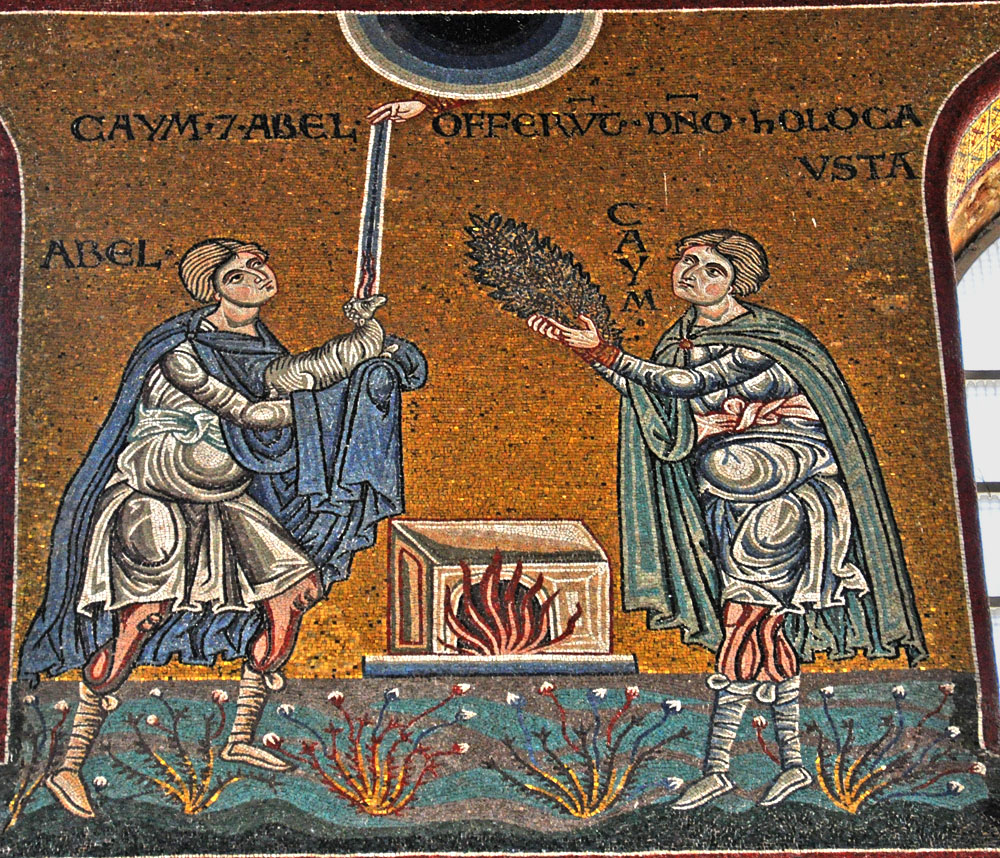
(Cathedral of the Assumption, Monreale, Sicily). The text portrayed is Genesis 4:3-5. The flame before the altar represents the idea of sacrifice, but God’s acceptance of Abel’s specific sacrifice is signified by the tongue of fire that has descended onto the lamb from God’s hand. For Cain, there is no hand, no divine fire. Jealous of his brother, Cain lures him into the wilderness and murders him.
Where do the wars and where do the conflicts among you come from? Is it not from your passions that make war within your members? You covet but you do not possess. You kill and envy but you cannot obtain; you fight and wage war. (James 4:1-2)
War. Conflict. The collapse of the natural order began with the Fall, when our first parents deliberately chose to do something they knew was wrong and their expulsion from the Garden into “this world,” this fallen state where everything is falling apart—brother kills brother from the beginning. Cain murders Abel (see a 12th century mosaic here) and many early theologians identified that as the definitive human sin rather than Eve eating the fruit of the Tree of Knowledge. Conflict and death have defined human existence since the Fall, however we choose to understand what that “fall” was. (Listen here to what St. Cyprian of Carthage thought about Cain killing Abel.)
The human race was created with a will which was naturally inclined toward God. We naturally want to be with God and want to live in harmony with God’s desires, God’s choices. This natural will is inherent in each of us. Some people call this natural will our conscience. But since the fall, our wills have unraveled and disintegrated. Now, in addition to our conscience, we each also have a personal will—the fancy jargon is “gnomic will”—that is in conflict with our conscience, in conflict with that natural will which is naturally inclined toward God. Our personal will is always in conflict with God, debating, struggling, taking time to think and argue with ourselves before choosing whether to follow our natural inclination, our conscience, or not.
To be truly and authentically human, we must bring our personal will into harmony with our natural will. To act based on our conscience. Our personality—each and every one of us—has to be knit back together again. That restoration of harmony between our conscience and our personal will, that knitting back together, can be aided and abetted—fostered—in a way most people never think of.
We can heed the warnings, the guidance and suggestions of our guardian angels. All too often we want to think angels are make-believe or fat babies with wings, roly-poly kids with curls and diapers and harps—new age-y figures in books about “angel healing,” more likely to appear as porcelain figurines on a shelf or on a Christmas card than in real life. But we each have a guardian angel, yoked to us as Michael is yoked to Israel in the book of Daniel in the Old Testament. We each have an angel who is assigned to look after us, to prod us to make the right choices—to whisper in our ears what we ought to choose.
We can heed our angels at all times, whether we are facing particular tribulations or not. We can add a line to our daily routine: “Guardian angel, help me to hear your voice, help me to pay attention to your guidance. Help me to make choices that align with my conscience, with the choices and desires of God.”
